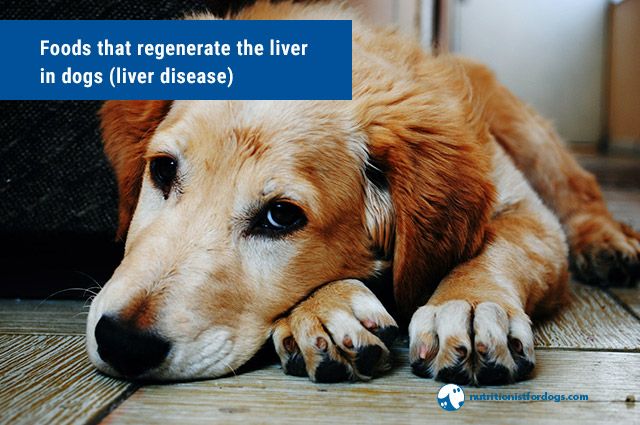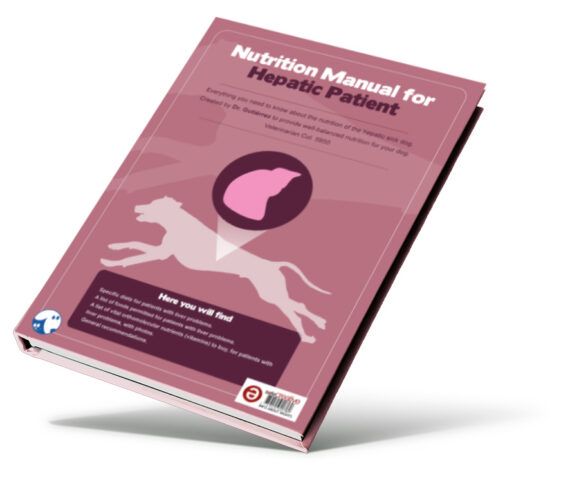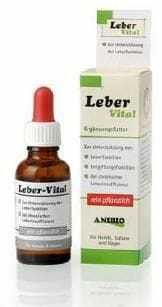Diets for dogs with liver disease are vital for this type of patient, as they are a natural liver protector.
Before going into the characteristics of the diet of the patient with an inflamed liver, it is important to clarify some key details in patients with liver problems.

The liver is the body’s laboratory, carrying out more than 1500 functions aimed at transforming incoming substances. Drugs and food pass through it to be metabolized. When this organ begins to fail seriously, many biochemical processes are triggered in the body and the damage is reflected in many systems.
If clinical nutrition plays a fundamental role in the recovery of the patient, the correct nutrition of the patient with liver disease is vital.
Although it has a great regenerative power, it is important to help it in this recovery. To achieve this goal, nutrition is essential to avoid foods that force each one of the cells that make it up, each is an individual laboratory that works in conjunction for the general welfare.
On the other hand, we must avoid as many drugs as possible because many of them pass through there, forcing him to work and forcing the production of enzymes. Let us remember that we are not using drugs, but foods that are not aggressive for him, on the contrary, positive for his recovery.
Fatty or inflamed liver in dogs
In general terms, I can tell you that when an organ is affected it suffers, to a greater or lesser degree, a degree of inflammation, the term “tis” in the medical field tells us that, inflammation of…. for example: gastritis (inflammation of the stomach), colitis (inflammation of the colon), phlebitis (inflammation of the veins), hepatitis is no exception.
If liver enzymes (TGP, TGO, ALT, AST…) are slightly elevated, it is not serious, but if they double or triple their value, we begin to talk about serious liver damage and here we may be at the gates of the dreaded fatty liver.
What is fatty liver? Let me summarize it simply and quickly: it is also known as hepatocellular steatosis or lipidosis. In essence, it is the excessive accumulation of fat inside the liver cells, the hepatocytes.
Do not panic, fat accumulation is normal, we all have it including our dogs or cats, the problem starts with the excess of this fat inside the cell.
When there is a serious problem affecting the liver, these cells begin to fail and degenerate, fatty degeneration begins, you must be careful not to reach these limits with your dog, because there is a point of no return, so it is key to follow the medical advice of your veterinarian. The nutritional ones with us ;-)) because as you will understand there is nothing healthy about feeding with those dry, industrialized balls that do not spoil ;-(((
Special consideration is needed when offering the amount of calories: the quantity and quality of carbohydrates, and the same goes for fat and type of protein, the latter should be of high quality vegetable origin.
Liver protector for dogs
I want you to know that the best natural protector for the liver is, without a doubt, diet.
Remember that the liver, as I told you above, is the body’s laboratory, where all nutrients are transformed. Do you think that these will not have a positive or negative effect depending on the type of nutrient? Of course they will. Let’s analyze them.
Proteins

There are forbidden foods in dogs with liver problems. The basic diet in this type of patients consists of avoiding meat proteins because they contain nitrogen that when decomposed produce ammonium, which is very toxic for the liver.
However, protein is essential to help that liver regenerate. As much quality vegetable protein as the patient can tolerate should be offered. One of the best quality vegetable proteins for this type of patient is undoubtedly Tofu.
Avoid meat proteins because they contain nitrogen that, when decomposed, produce ammonium, which is very toxic for the liver.
Commercial foods for liver patients contain low levels of protein, which contributes to low levels of ammonium in the blood, which is very good for the patient! The problem with these diets is that they do not provide quality protein because it is expensive, and protein is essential to help the liver regenerate.
Dairy proteins are a good choice. Very high quality protein, such as cheese.
There are alternatives such as Royal canin’s Hepatic or Hills’ h/d or l/d. In short, they are not the best alternatives. As a COMPLEMENT they are good, but only in small quantities.
Which one would you choose as a COMPLEMENT? Hills.
Why? Above I mentioned the importance of avoiding meat proteins, and poultry, as well as liver, are among the first components of Royal Canin’s Hepatic diet.
But Hills is not the best either. It falls into a big contradiction, in its page it gives the option of using h/d or l/d for patients with hepatopathy, but the first one has as first ingredient chicken (meat protein), the second one, the l/d (better option) only offers vegetable protein Well! Where is the problem? It only offers low quality vegetable protein.
High-quality protein (plant-based) is essential to help the liver regenerate.

Carbohydrates
Carbohydrates must be of high quality and digestibility, in order to provide the patient with energy easily so that the liver does not “waste time looking for it” and can dedicate itself exclusively to its regeneration. The best carbohydrate for the dog, without any doubt, is boiled rice.
The dog does not need cereals such as rice, it is a carnivore, but a patient with liver problems cannot and should not consume meat proteins.
The dog is a carnivore and needs almost no carbohydrates, much less in the form of cereal such as rice. A healthy dog should consume them occasionally, but nothing more. The problem is that we are talking about a sick patient who cannot consume animal protein, like any good carnivore.

Fiber
Adding a bit of vegetables (green beans, spinach) is always beneficial because the fiber absorbs endotoxins from the intestine (especially the large intestine) and with this we avoid that these toxins reach the liver. The problem is that many times they do not like vegetables. If you can sauté some chicken fat and garlic (they like it) and try to give it to them, it would be very good. Or mixed in the diet we are going to prepare.
How to detoxify a dog’s liver. Orthomolecular nutrients
Undoubtedly, every day nutrition plays a fundamental role in the recovery of sick patients, and in liver patients there is not the slightest doubt.
Science has been discovering specific nutrients that by themselves can be very harmful or beneficial for certain organs. That is orthomolecular nutrition: specific nutrients for specific diseases. Through my website you will find them, Denamarin, SAM-e Enzyme, Omega 3…
Here is one that you should definitely use if your dog has liver disease: Leber Vital! You can use them without a doctor’s prescription! I remind you that they are FOODS and not DRUGS, so their margin of danger is practically non-existent.
Turmeric and boldo have demonstrated, in the hepatic sick dog, to have a detoxifying power of the organ as well as of substances of the metabolic waste.
You will see how I show you products for human use, when possible, because in general they are much cheaper than those for veterinary use. If I recommend this German laboratory: Anibio, it is because of its high quality and more than affordable prices, and especially because they are specific for our dogs.
Leber Vital is a very good product of this German laboratory because it can be administered in drops under an exact dosage because it has been created specifically for our dogs.
If you want to know about puppy nutrition, I recommend my puppy food article.
Subscribe to the free online workshop on dog nutrition
Greetings

